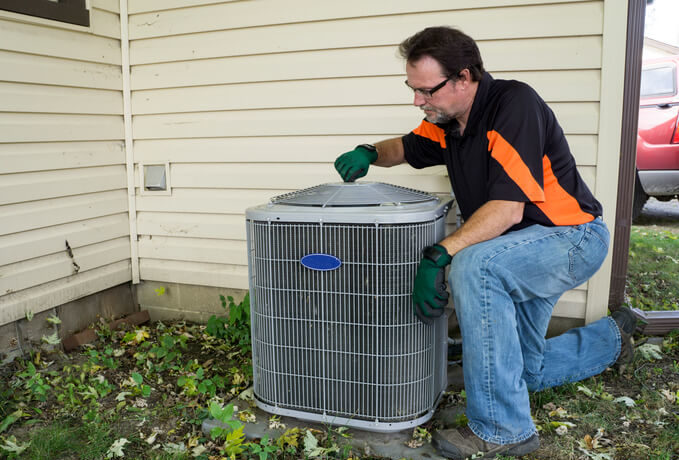If your air conditioner’s icing up, you’ll know it, even if you can’t see the ice. Just place your hand over a supply register, and if you feel minimal airflow, you could have a frozen air conditioner on your hands. Before you learn what causes an air conditioner to freeze, you need to know what steps to take if your A/C has frozen over.
What to do if your air conditioner freezes
- Shut off the A/C to prevent wasting money and risking damage to the compressor.
- While you wait for the ice to melt, find the condensate drain and make sure it isn’t blocked.
- Consider opening up the ductwork so you can suction out the water with a wet-dry shop vac.
- Speed up the melting process by taking a blow dryer to the evaporator coil. You can also simply turn on the A/C fan without running the compressor to melt the ice faster.
- For a window air conditioner, make sure the unit’s tilted slightly backward so the melting ice drains to the exterior. From the outside, clear the unit’s condensate drain hole to ensure water can filter out.
- Once the ice is melted and the unblocked drain pan is empty, turn the air conditioner back on. It should start cooling off your home immediately.
What causes an air conditioner to freeze?
Several issues could be causing the problem. Here are the most probable:
- Low refrigerant levels: Whether you have a leak or the refrigerant was charged incorrectly during installation, low refrigerant levels can make the evaporator coil too cold. Call an HVAC professional to fix the leak and recharge the system according to the manufacturer’s directions.
- Dirty air filter: This is one primary culprit of low airflow, not to mention added stress on the compressor and other A/C components. Low airflow delivers less air to the evaporator coil for cooling. A sufficient flow of hot, humid air is an important aspect of preventing the coil from freezing. Clean the filter monthly to prevent this from being what causes an air conditioner to freeze.
- Closed supply registers: Shutting supply registers in unoccupied rooms is a technique for saving money and energy. However, if you close too many, it could end up costing you more if the air conditioner freezes up. Make sure no more than a quarter of your home’s supply registers are closed to prevent freezing.
- Insufficient fan speed: The fan must blow fast enough to keep the proper amount of air blowing over the evaporator coil. A technician can increase the fan speed and do away with what causes an air conditioner to freeze.
Other Freezing Issues
- Thermostat problems: The air conditioner may run all night when it’s not necessary to do so. This wastes energy and money while possibly causing your air conditioner to freeze. Have the thermostat checked out to solve the issue.
- Drainage problems: When hot, humid air blows across the evaporator coil, the coil removes heat as well as moisture from the air. In humid climates such as Georgia, a lot of water vapor is turned into condensation within the air conditioner. Under normal circumstances, the water drips into a pan and out a floor drain. If something blocks the drain, the backed-up water freezes all the way back to the evaporator coil. Then, the ice blocks the drain and exacerbates the problem. Check and clear the drainpipe weekly during the hottest parts of the summer. You should see water dripping into the pan and exiting through the floor drain.
- Improperly tilted window air conditioner: The unit should be tilted slightly so the indoor portion is slightly higher than the outdoor half. Otherwise, water doesn’t exit the drain hole. Instead it sticks around inside the unit where it can freeze. That’s why an improper tilt is another of what causes an air conditioner to freeze.
Prevent an iced-up air conditioner
To sum up, here’s what you need to do to prevent the A/C from freezing:
- Have the refrigerant level checked
- Change the filter monthly
- Keep the supply vents open
- Have the fan speed increased
- Have the thermostat checked out
- Inspect the condensate drain weekly
- Make sure any window units you have are angled correctly
All in all, the best way to avoid what causes an air conditioner to freeze is to schedule annual preventative maintenance. To learn more, or to schedule a repair, please contact Byrd Heating and Air Conditioning. We’ve proudly served Savannah and the surrounding area since 1986.


